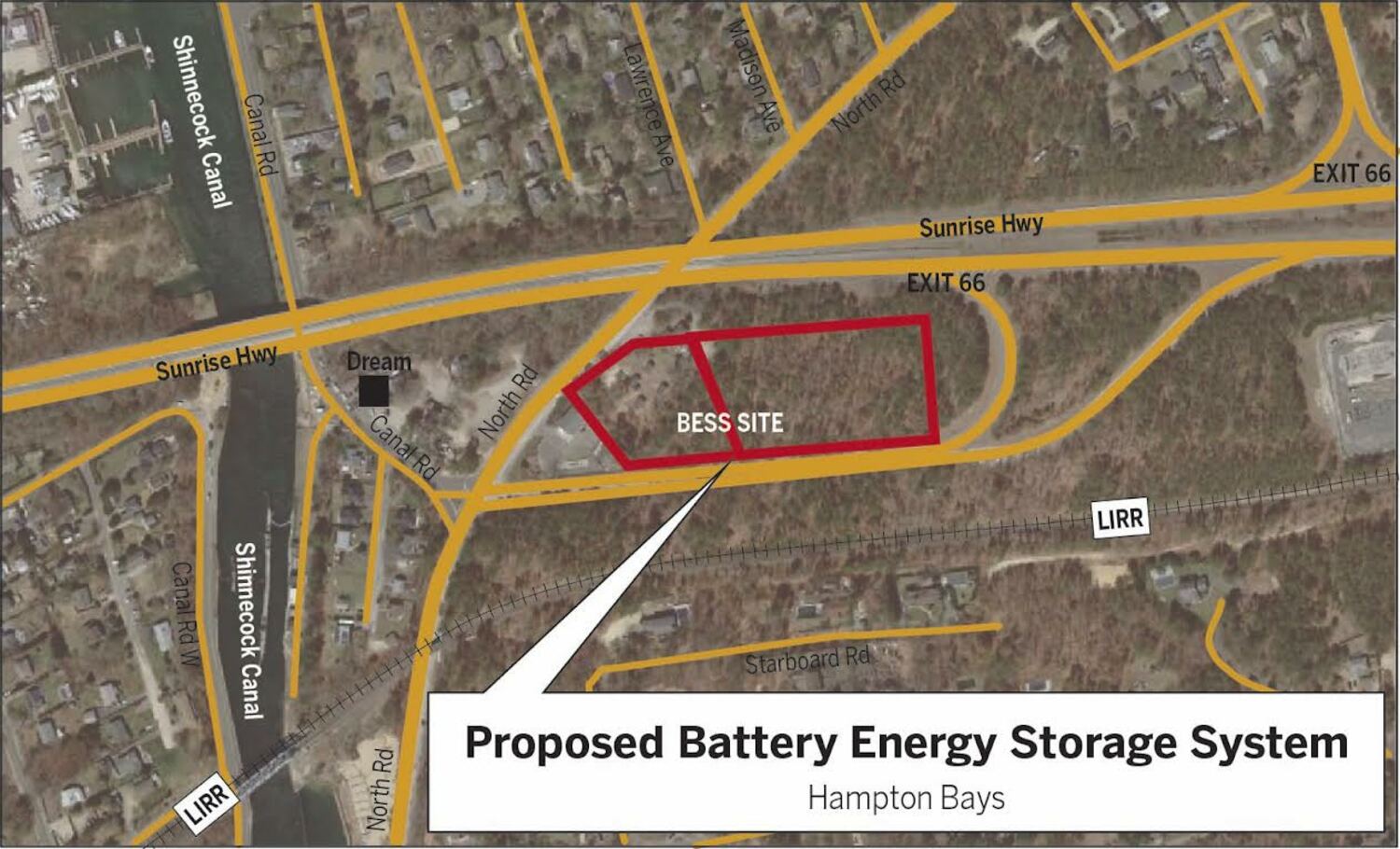
Southampton Town Board members have changed course and will vote this week to hold a hearing on a six-month moratorium on battery energy storage facility applications — one that includes a controversial proposal in Hampton Bays that’s already under review.
Members of both the Town Board and Planning Board have confronted a variety of moving parts as they have mulled the moratorium on the systems and whether to include the one application already in process.
This Thursday, July 20, at 10:30 a.m., the Town Board is expected to approve a resolution setting an August 8 public hearing on a six-month moratorium that includes the controversial Canal Southampton BESS in Hampton Bays.
The moratorium, as described by Town Attorney James Burke, would pause processing by the Planning Board of the Canal application and ban the submission of any new applications while it is in effect.
According to a media release from Supervisor Jay Schneiderman’s office, “The moratorium will allow the Town Board to study the current code and make sure it is sufficient to address public safety concerns. It will allow changes to the code that may force changes to the current project and could render it noncode compliant.”
According to the media alert, “The moratorium will prevent any processing by the Planning Board and will prevent the building inspector from issuing any permits to construct a BESS facility. It will also prevent ZBA action.”
The resolution’s full text was not available at the time of the alert on Monday, July 17.
While opponents of the Canal Southampton want to see it denied outright, the goal of the moratorium is to offer time for members of reviewing agencies to learn more about BESS, for emergency responders to train for responding to a BESS fire, and for officials to consider tweaking the BESS code adopted in 2020. Those who spoke in favor of the moratorium specifically railed against the code allowing them in residentially zoned communities.
So far, Schneiderman has referenced that request but also noted that the scope of facilities might also be eyed.
In the meantime, Canal’s application to site 30 battery enclosures, each with 24 battery modules, on a 4.9-acre property located off North Road in Hampton Bays is already at a standstill. A hearing on the proposal held in June was adjourned indefinitely.
Opponents have called upon planners to rescind its declaration of environmental significance under the State Environmental Quality Review Act, deciding that it would not have the potential for significant environmental impacts. The law allows the board to rescind the SEQRA declaration if new information has come to the fore. Burke said recent news of fires at facilities may justify the move.
During a July 11 hearing on a proposed three-month moratorium, Schneiderman said planners were poised to rescind their declaration.
The Planning Board could revise its SEQRA declaration to call for a more comprehensive environmental review, something that would take significantly longer than six months. Schneiderman also said that the applicant may not be able to answer questions about fire safety protocols to the satisfaction of the Planning Board and they could deny the application.
And if the Town Board revises the BESS code to excise sections that permit them in residentially-zoned areas, the project could end up disallowed in the residential area where it is proposed. The Town Board could also change its BESS law to allow for smaller projects than Canal, meaning the developer would be sent back to the drawing board to downsize their plan.
Lawsuits are the concern of officials crafting the moratorium. Typically, applications already in process are exempted from moratoriums. Rare, too, is the rescinding of a SEQRA declaration. The Planning Board has yet to publicly weigh in on changing the determination.
They did, last week, take care of old business — the earlier iteration of a moratorium that called for a three-month pause and exemption of applications is underway. Town procedure calls for seeking the Planning Board’s opinion on certain town proposals. So they were asked to opine about the earlier version. Members said they prefer a six-month pause that includes the Canal site. Chairwoman Jacqui LoFaro noted the board articulated its desire for a moratorium earlier this spring in a letter “nobody could find.”
The Town Trustees were not asked to weigh in on the moratorium, but did nonetheless. In time for last week’s public hearing, they submitted a missive, signed by all five members of the elected body. Pointing out they are the owners of roughly 25,000 acres of bottomlands that contain shellfish with a value in excess of $10 million, the trustees wrote, “To say that we have an interest in maintaining water quality in the Town of Southampton would be an understatement.”
Writing in support of the moratorium, as well as the rescinding of the SEQRA, they wrote, “Our neighbors and first responders are entitled to know all of the potential hazards they will be facing if such a facility were to be allowed to exist in their neighborhood, and beyond.”